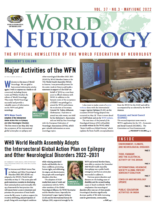By Wolfgang Grisold
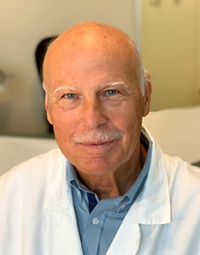
Wolfgang Grisold
Welcome to this issue of World Neurology. We are glad to have several informative articles again. I wish to express my thanks to all concerned, including Steven Lewis and Walter Struhal, the editors of World Neurology. They make World Neurology successful and provide a valuable source of information on the WFN and global neurology.
WFN Major Events
Adoption of the Intersectoral Global Action Plan on Epilepsy and other Neurological Disorders
The first event in late May 2022 was the acceptance of the international global action plan on epilepsy and other neurological disorders 2022- 2031 (IGAP) by WHO Member States at the 75th World Health Assembly (WHA) in Geneva. I was personally present for the entire week in Geneva and made a statement in support of the IGAP on behalf of WFN as a non-State actor in official relations with WHO. In addition to the fantastic news of the acceptance of IGAP, I was privileged to attend the WHA and witness the re-election of Secretary General Dr. Tedros Adhanom Ghebreyesus. I had time to attend two side events, one held by the Alzheimer’s Association and one held by One Neurology with the European Federation of Neurologic Associations (EFNA), which gave valuable information on some neurology topics.
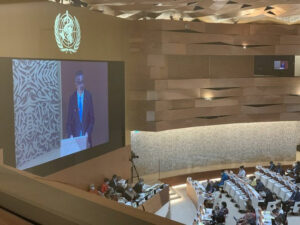
Geneva conference
I also want to make a note of a joint webinar done with the International League Against Epilepsy (ILAE) on the occasion of IGAP being adopted that occurred on May 28. There is more detail on IGAP below and on the WFN website.
The next issue of the Journal of the Neurological Sciences (JNS) will publish an article written by the WHO, titled “Brain Health as a Global Priority,” which explains the brain health conceptualization from the WHO for the IGAP and will be accompanied by an editorial by the WFN trustees.
Economic and Social Council (ECOSOC)
The second important news event is WFN’s application for the UN—Economic and Social Council (ECOSOC). The Committee on Non-Governmental Organizations at its 2022 Regular Session, held in May and June, decided to recommend the World Federation of Neurology for special consultative status with ECOSOC. This recommendation is subject to the endorsement of the Economic and Social Council, which will consider and take action on the committee’s recommendations at a management meeting in late July 2022.
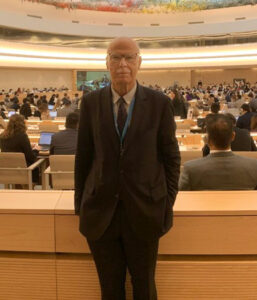
Wolfgang Grisold at the WHO
One of the critical, wide-ranging activities of ECOSOC is the Sustainable Development Goals (SDGs). The SDGs are a “blueprint to achieve a better and more sustainable future for all.” They address the global challenges we face, including health, poverty, inequality, climate change, environmental degradation, peace, and justice.
World Brain Day
Brain health and IGAP are closely connected with WFN’s World Brain Day (WBD). This year, the topic of World Brain Day is Brain Health, with the tagline “Brain Health for All.” The WBD organizing committee has all six WFN regional associations involved in planning, and we hope to continue the momentum of this positive communication after July 22.
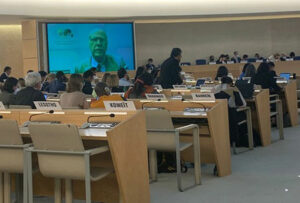
Wolfgang Grisold delivering the WFN statement.
The topic of brain health also links with our previous Brain Health Initiative, WHO’s Brain Health unit, the IGAP, and many other activities such as the EAN Brain Health summit. To celebrate WBD on July 22, the WFN will host a webinar, which will focus on key messages of brain health, provide statements from the regions, and offer a Q/A session. We hope the WFN Member Societies will be able to celebrate WBD in their countries and regions. A toolbox with useful WBD material can be downloaded from the WFN website.
Council of Delegates
The Council of Delegates meeting (COD) is the annual decisive meeting of the WFN. This year’s meeting will take place
Oct. 25, 2022, in Amsterdam, in conjunction with the ECTRIMS conference. It will be a live meeting of delegates, but we will also provide a hybrid platform for those who cannot attend.
An Officer and Elected Trustee will be voted on 1) the position of the Secretary-General (vacated by myself), and the position of one trustee (vacated by Steven Lewis). The WFN Nominating Committee has scrutinized the applications, and you will find their proposal and all the candidates’ statements on the website soon. As in all COD meetings, the Trustees’ Report and several other reports and documents will be presented to the delegates.
Voting will be electronic, before the in-person portion of the meeting. Instructions and help will be provided by the WFN secretariat.
Education, Training Centers, and Department Visits
One of the core activities and mission of the WFN is to promote quality neurology through education. We are glad that the educational activities of the WFN prosper, and the trustees have decided to add a 4-year complete training to Rabat and also a fellowship on stroke in Cape Town.
This increases our 4-year training positions in Africa to three, and the WFN 1-year fellowships in Africa to four. We are indebted to our Specialty Group on Neuromuscular Disease and their International Congress on Neuromuscular Disease (ICNMD), which sponsors an additional fellowship for neuromuscular diseases in Rabat and also has invited the last ICNMD trainee to the ICNMD congress in Brussels this year.
The next fellowship calls will be for Cairo and Mexico. A site for the Asian Training Center has not been decided upon.
The WFN`s mission to provide education is aimed not only at supporting individual training but to help and empower the regions in their efforts to train neurologists in high-standard WFN teaching centers. This activity in Africa is achieved jointly with African Academy of Neurology (AFAN), and in Latin America with the Mexican Academy of Neurology and Pan American Federation of Neurology (PAFNS).
The WFN Department Visits were paused during the COVID pandemic, and we have now advertised Department Visits for Austria, Canada, and Germany, with a total of nine positions open. We are grateful to our Member Societies for giving young neurologists this important opportunity.
Educational Days
The WFN has developed the concept of E-learning Days, which were initially aimed at Africa. This is a one-day concept with a mix of regional and international speakers. The WFN and AFAN have organized E-learning Days on stroke and epilepsy. This year‘s theme is movement disorders, to be held on Sept. 3.
In cooperation with AFAN and the International Headache Society Global Patient Coalition (IHS GPAC), we have had another virtual program on “Education in Headache to Healthcare Providers in Africa.” We want to thank our partners for their generous support.
Participation in the educational days is free, and a certificate of attendance can be obtained after providing feedback on the event.
The platform for the educational days has been well established, and many thanks to Riadh Gouider, who spent considerable time building this structure jointly with a Tunisian professional conference organizer (PCO).
Webinar
In March, the WFN held a webinar on “The Neural Regulation of Cancer,” organized by the WFN Specialty Group on Neuro-Oncology on the topic of “The Neural Regulation of Cancer.”
It was a high-quality webinar focusing on new aspects of neurobiology. This webinar was hosted with the successful cooperation of the Society for Neuro-Oncology (SNO) and had 300 attendees.
Congresses and Meetings
International Congress of Neuromuscular Diseases ICNMD
The WFN Neuromuscular Specialty Group, the ICNMD, is preparing for the congress in Brussels in July. All topics of neuromuscular diseases are covered, and it seems the large number of participants that was reached at the ICNMD 2018 in Vienna will be reached again. The local organizing chair is Prof. Gauthier Remiche from Brussels, and the PCO is ICS.
The WFN ICNMD will have a session on neuromuscular issues in low-income parts of the world, and will be chaired by Riadh Gouider and Wolfgang Grisold.
The next ICNMD congress will be in Perth in 2025, and a call for the ICNMD following Perth is going out soon.
World Congress of Neurology (WCN) 2023
The next WCN will be in Montreal, Canada, from Oct. 13-19, 2023.
The Canadian Neurological Society will co-host this congress, and the congress chair is Prof. Guy Rouleaux, WFN vice president.
The preparations for the scientific program are in full development and chaired by Prof. Matthew Kiernan. Please follow our website and social media for further developments and announcements. For the second time, this congress will be in part also virtually available as a hybrid.
World Congress of Neurology WCN 2025 Seoul
Following the WCN in Montreal, the next WCN in 2025 will take place in Seoul, South Korea, and the organizational work has been initiated.
EAN Vienna, June 2022
At the end of June, the European Academy of Neurology (EAN) held its congress in Vienna, Austria. The WFN had a leadership meeting with the EAN, a joint session on brain health, and hosted a mixed live/virtual WFN trustee meeting. In addition to the Regional Teaching Course and the participation of the WFN in the Brain Health Summit, further cooperation was discussed.
We will continue to participate in meetings of each of the six regional associations and have joint sessions to discuss present issues and provide visions for the future.
Summary
The past months have been a success for neurology worldwide, with the WFN actively involved. Special thanks to the previous administration, Prof. Bill Carroll, who was supported by Prof. Alla Guekht and WFN Strategy and Program Director Kimberly Karlshoej, who proceeded with the important activity of relations with the WHO and IGAP and also laid the foundations of this continuing development.
Yet celebration needs to be followed by action, and the IGAP will need further work and implementation, which consists of awareness and advocacy for political action, treatment and therapy, rehabilitation, prevention, innovation, and research. All WFN Member Societies are invited to be involved in this global mission.
The implementation of IGAP is a vast worldwide advocacy project, which demands effort — both bottom-up and top-down approaches are needed. •
